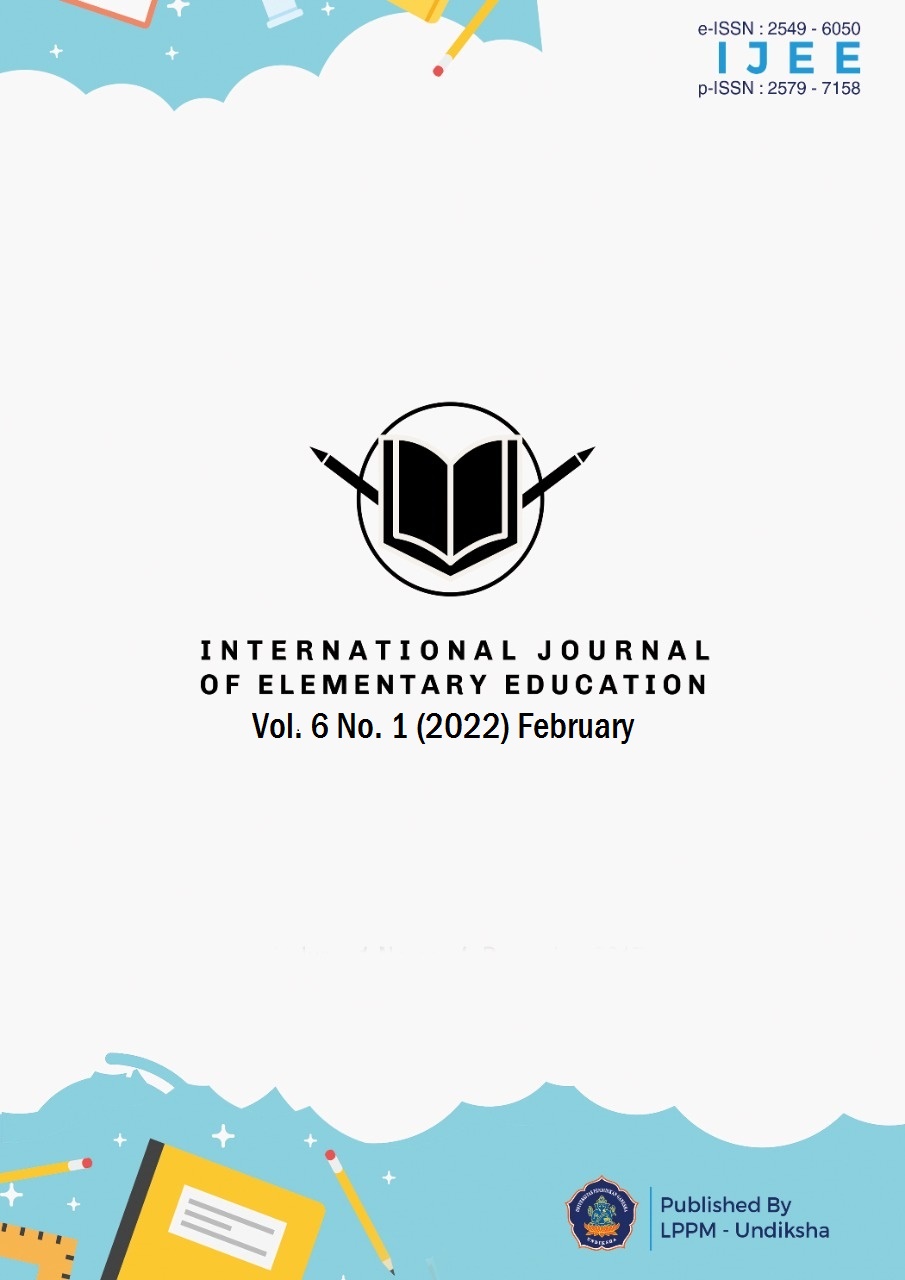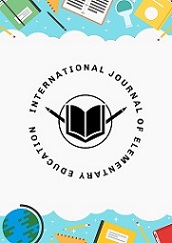Teachers’ Experiences of Online Learning at Indonesian Elementary School during the Covid-19 Pandemic
DOI:
https://doi.org/10.23887/ijee.v6i1.42676Keywords:
Covid-19, narrative study, teachers’ experiences, online learningAbstract
Pandemi Covid-19 yang terjadi memaksa proses pembelajaran dilakukan secara online atau pembelajaran online. Di masa pandemi COVID-19, efektivitas kinerja guru dapat dilihat dari kualitas kinerja guru dalam melaksanakan pembelajaran online yang melibatkan media teknologi informasi dan komunikasi. Penelitian ini bertujuan untuk mengeksplorasi bagaimana guru SD Indonesia dapat beradaptasi dengan pembelajaran online, mengembangkan pembelajaran mandiri, dan membangun motivasi belajar pada pembelajaran online yang diterapkan oleh universitas di Indonesia selama pandemi COVID-19. Penelitian ini menggunakan pendekatan kualitatif dengan studi naratif. Data dikumpulkan dari wawancara online terhadap 11 pengalaman guru SD Indonesia tentang pembelajaran online di Sekolah Dasar Indonesia di Yogyakarta, Indonesia. Analisis data menggunakan analisis isi. Ada empat temuan penelitian ini, yaitu kemampuan guru bahasa Indonesia untuk beradaptasi dengan pembelajaran online, strategi guru bahasa Indonesia untuk membangun kemandirian belajar, kemampuan guru bahasa Indonesia untuk meningkatkan motivasi belajar siswa, dan jenis platform yang digunakan guru bahasa Indonesia dalam pembelajaran. pembelajaran online. Dapat disimpulkan bahwa guru SD Indonesia harus memiliki kemampuan beradaptasi dengan pembelajaran online, strategi membangun kemandirian belajar, kemampuan meningkatkan motivasi belajar siswa, dan menggunakan jenis platform dalam pembelajaran daringReferences
Abidah, A., Hidaayatullaah, H., Simamora, R., Fehabutar, D., & Mutakinati, L. (2020). The Impact of Covid-19 to Indonesian Education and Its Relation to the Philosophy of “Merdeka Belajar.” Studies in Philosophy of Science and Education, 1(1), 38–49. https://doi.org/10.46627/sipose.v1i1.9.
Azorin, C. (2020). Beyond COVID-19 supernova: Is another education coming? Journal of Professional Capital and Community. https://doi.org/10.1108/JPCC-05-2020-0019.
Barry, S. (2019). The role of video and text chat in a virtual classroom: How technology impacts community. Educational Technology and Resources for Synchronous Learning in Higher Education. https://doi.org/10.4018/978-1-5225-7567-2.ch009.
Charles, A. O., & Babatunde, I. G. (2014). Page design and implementation of a web-based virtual classroom system. IOSR Journal of Research & Method in Education (IOSRJRME), 4(3), 68–77.
Clandinin, D. J. (2006). Narrative inquiry: A methodology for studying lived experience. Research Studies in Music Education, 27(1), 44–54. https://doi.org/10.1177/1321103X060270010301.
Clandinin, D. J., & Connelly, F. M. (2000). Narrative inquiry: Experience and story in qualitative research. Jossey-Bass.
Dasopang, M. H., & Lubis, A. H. (2021). line learning during the covid-19 pandemic: How is it implemented in elementary schools? Premiere Educandum: Journal of Basic Education and Learning, 11(1), 120 – 134. https://doi.org/10.25273/pe.v11i1.8618.
Dhawan, S. (2020). Online learning: A panacea in the time of COVID-19 crisis. Journal of Educational Technology Systems, 49(1), 5–22. https://doi.org/10.1177/0047239520934018.
Erawati, G. A. S. A., Widiana, I. W., & Japa, I. G. N. (2021). Elementary school reachers’ problems in online learning during the pandemic. International Journal of Elementary Education, 5(4), 562–573. https://doi.org/10.23887/ijee.v5i4.39233.
Fauzi, I., Salim, H., & Syafrudin, U. (2021). ). Online learning paradigm in elementary schools: An evaluation by teachers in Indonesia during COVID-19 pandemic. Journal Iqra’ Kajian Ilmu Peendidikan, 6(2), 166–183. https://doi.org/10.25217/ji.v6i2.1610.
Gedera, D. S. ., Williams, P. ., & Wright, N. (2013). An activity theory analysis of moodle in facilitating asynchronous activities in a fully online university course. International Journal of Science and Applied Information Technology, 2, 6–10.
Hammersley, M., & Traianou, A. (2012). Ethics in qualitative research controversies and context. Sage.
Harrison, R. A., Harrison, A., Robinson, C., & Rawlings, B. (2018). The experience of international postgraduate student teachers on a distance-learning programme. Distance Education, 39(4), 480–494. https://doi.org/10.1080/01587919.2018.1520038.
Hitchcock, L. I., Sage, M., & Smyth, N. J. (2019). Teaching social work with digital technology. Council on Social Work Education.
Joiner, J. M., & Patterson, D. (2019). Voice thread as a tool in online BSW education. Journal of Teaching in Social Work, 39(4), 440–454. https://doi.org/10.1080/08841233.2019.1649787.
Kadafi, A., Alfaiz, A., Ramli, M., Asri, D. N., & Finayanti, J. (2021). The impact of islamic counseling intervention towards students’ mindfulness and anxiety during the covid-19 pandemic. Islamic Guidance and Counseling Journal, 4(1), 55–66. https://doi.org/10.25217/igcj.v4i1.101.8
Kumar, J. A., Bervell, B., & Osman, S. (2020). Google classroom: Insights from Malaysian higher education students’ and instructors’ experiences. Education and Information Technologies. https://doi.org/10.1007/s10639-020-10163.
Larson, E., Aroz, J., & Nordin, E. (2019). The goldilocks paradox: The need for instructor presence but not too much in an online discussion forum. Journal of Instructional Research, 8(2), 22–33.
Lengkanawati, N. (2017). Learner autonomy in the Indonesan efl settings. Indonesian Journal of Applied Linguistics, 6(2), 222–231. https://doi.org/10.17509/ijal.v6i2.4847.
Ma, Q. (2017). ). A multi-case study of university student teachers’ language-learning experience mediated by mobile technologies: A socio-cultural perspective. Computer Assisted Language Learning, 1–21. https://doi.org/10.1080/09588221.2017.1301957.
Malczyk, B. R. (2019). Introducing social work to hyflex blended learning: A student-centered approach. Journal of Teaching in Social Work, 39(4), 414–28. https://doi.org/10.1080/08841233.2019.1652226.
Maulana, H. A. (2021). Psychological Impact of Online Learning during the COVID-19 Pandemic: A Case Study on Vocational Higher Education. Indonesian Journal of Learning Education and Counseling, 3(2), 130–139. https://doi.org/10.31960/ijolec.v3i2.833.
McMahon, M., & Oliver, R. (2001). Promoting self-regulated learning in an online environment. Ed-Media 2001 World Conference on Educational Multimedia, Hypermedia & Telecommunications. Association for the Advancement of Computing in Education (AACE).
Mishra, L., Gupta, T., & Shree, A. (2020). Online teaching-learning in higher education during lockdown period of COVID-19 pandemic. International Journal of Educational Research Open, 1(1). https://doi.org/10.1016/j.ijedro.2020.100012.
Molise, H., & Dube, B. (2020). Emergency online teaching in economic and management sciences necessitated by the COVID-19 pandemic: The need for healthy relations in a rural schooling context. International Journal OfLea Rning, Teaching and Educational Research, 19(6), 387–400. https://doi.org/10.26803/ijlter.19.6.23.
Moorhouse, B. L. (2020). Adaptations to a face-to-face initial teacher education course ‘forced’ online due to the COVID-19 pandemic. Journal of Education for Teaching, 46(4), 1–3. https://doi.org/10.1080/02607476.2020.1755205.
Murtikusuma, A. I. (2019). Development of blended learning based on google classroom with using culture theme in mathematics learning. Journal of Physics: Conference Series, 1165:12017. https://doi.org/10.1088/1742-6596/1165/1/012017.
Raaper, R., & Brown, C. (2020). The Covid-19 pandemic and the dissolution of the university campus: Implications for student support practice. Journal of Professional Capital and Community. https://doi.org/10.1108/JPCC-06-2020-0032.
Reswari, G. P. A., & Kalimanzila, J. (2021). Re-promoting autonomous learning for university students: A lesson from pandemic Covid-19. Journal Ilmiah Profesi Pendidikan, 6(1), 38–47. https://doi.org/10.29303/jipp.v6i1.144.
Rodriguez-Keyes, E., & Schneider, D. . (2013). Cultivating curiosity: Integrating hybrid teaching in courses in human behavior in the social environment. Journal of Teaching in Social Work, 33(3), 227–38. https://doi.org/10.1080/08841233.2013.796304.
Sabah, N. M. (2019). Motivation factors and barriers to the continuous use of blended learning approach using moodle: Students’ perceptions and individual differences. Behaviour & Information Technology, 1–24. https://doi.org/10.1080/0144929X.2019.1623323.
Sreehari, P. (2020). Online learning during the COVID-19 lockdown: Learners’ perceptions. Journal of Critical Reviews, 7(19), 300–307.
Stoetzel, L., & Shedrow, S. (2020). Coaching our coaches: How online learning can address the gap in preparing K-12 instructional coaches. Teaching and Teacher Education, 88, 102959. https://doi.org/https://doi.org/10.1016/j.tate.2019.102959.
Su, Y., Li, Y., Liang, J. C., & Tsai, C. C. (2018). Moving literature circles into the wiki-based environment: The role of online self-regulation in EFL learners’ attitude toward collaborative learning. Computer Assisted Language Learning, 32, 5–6. https://doi.org/10.1080/09588221.2018.1527363.
Tambunan, A. R. S., Hamied, F. A., & Sundayana, W. (2018). motivation and competence in an Indonesian context as assessed within the framework of Maslow‟s and Herberg‟s theories. Indonesian Journal of Applied Linguistics, 8(1), 68–78. https://doi.org/10.17509/ijal.v8i1.11481.
Teo, et al. (2019). Factors that influence university students’ intention to use moodle: A study in Macau. Educational Technology Research and Development, 67(3), 749–66. https://doi.org/10.1007/s11423-019-09650.
Tesar, M. (2020). Towards a post-Covid-19 ‘new normality?’: Physical and social distancing, the move to online and higher education. Policy Futures in Education, 18(5), 556–559.
Widodo, H. P. (2014). Methodological considerations in interview data transcription. International Journal of Innovation in English Language Teaching and Research, 3(1), 101–109.
Yulianto, S. W. (2019). Learner autonomy desirability and feasibility in Indonesian EFL classrooms: University students’ voices. ELT in Focus, 2(1), 34–40.
Downloads
Published
How to Cite
Issue
Section
License
Copyright (c) 2022 Banun Havifah Cahyo Khosiyono

This work is licensed under a Creative Commons Attribution-ShareAlike 4.0 International License.
Authors who publish with the International Journal of Elementary Education agree to the following terms:
- Authors retain copyright and grant the journal the right of first publication with the work simultaneously licensed under a Creative Commons Attribution License (CC BY-SA 4.0) that allows others to share the work with an acknowledgment of the work's authorship and initial publication in this journal.
- Authors are able to enter into separate, additional contractual arrangements for the non-exclusive distribution of the journal's published version of the work (e.g., post it to an institutional repository or publish it in a book), with an acknowledgment of its initial publication in this journal.
- Authors are permitted and encouraged to post their work online (e.g., in institutional repositories or on their website) prior to and during the submission process, as it can lead to productive exchanges, as well as earlier and greater citation of published work. (See The Effect of Open Access)










